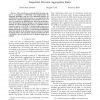Free Online Productivity Tools
i2Speak
i2Symbol
i2OCR
iTex2Img
iWeb2Print
iWeb2Shot
i2Type
iPdf2Split
iPdf2Merge
i2Bopomofo
i2Arabic
i2Style
i2Image
i2PDF
iLatex2Rtf
Sci2ools
108
click to vote
CDC
2010
IEEE
2010
IEEE
Accuracy and decision time for a class of sequential decision aggregation rules
Abstract-- This work focuses on decentralized decision making in a population of individuals each implementing the sequential probability ratio test. The individual decisions are combined into a decentralized decision via an aggregation rule chosen from a family of aggregation rules, denoted as q out of N rule. We study how the population size affects the performance of the decentralized decision making, i.e., the decision accuracy and time. In a group applying the q ouf of N, a global decision is reached as soon as q out of the N decision makers agree on an answer. Under the assumption of measurement independence among individuals, we introduce a novel numerical method that allows the analysis of the decision accuracy and time of a group of decision makers. We present the numerical method and show a preliminary sets of results that can be obtained using such a method.
Related Content
| Added | 13 May 2011 |
| Updated | 13 May 2011 |
| Type | Journal |
| Year | 2010 |
| Where | CDC |
| Authors | Sandra H. Dandach, Ruggero Carli, Francesco Bullo |
Comments (0)

